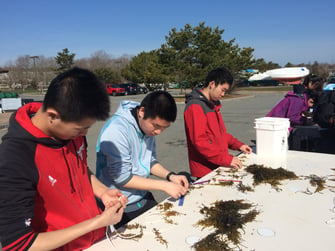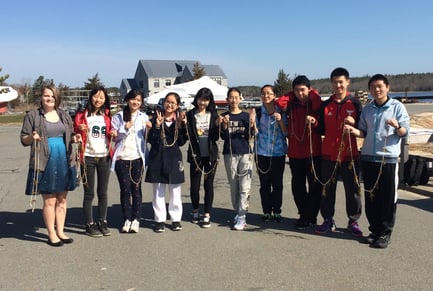 We hear frequently about the critical state of the world’s oceans and marine life in peril. Yet too often, we are left feeling helpless - not knowing what we can do to make a difference. This week, Dave Bill and I delivered an Ocean Stewardship lesson to Nautical Science classes and to the Beijing, China exchange students from RDFZ School about ocean acidification. As the oceans absorb rising levels of carbon dioxide from the air, in turn, the excess carbon dioxide lowers the pH of the water. This absorption of CO2 changes the water chemistry and affects shelled animals and reef building corals negatively.
We hear frequently about the critical state of the world’s oceans and marine life in peril. Yet too often, we are left feeling helpless - not knowing what we can do to make a difference. This week, Dave Bill and I delivered an Ocean Stewardship lesson to Nautical Science classes and to the Beijing, China exchange students from RDFZ School about ocean acidification. As the oceans absorb rising levels of carbon dioxide from the air, in turn, the excess carbon dioxide lowers the pH of the water. This absorption of CO2 changes the water chemistry and affects shelled animals and reef building corals negatively.
 So what did we do to help? Seaweed photosynthesizes to obtain energy, which requires carbon dioxide. Our Tabor classes and our visitors from China made seaweed lines to be tied off in the harbor, which will grow and use carbon dioxide while doing so. The seaweed growth will monitored by us and will eventually be harvested, composted and added to Tabor’s community garden as fertilizer. This project may seem like a minor contribution but if everyone found a small way to help our oceans, the impact would be profound.
So what did we do to help? Seaweed photosynthesizes to obtain energy, which requires carbon dioxide. Our Tabor classes and our visitors from China made seaweed lines to be tied off in the harbor, which will grow and use carbon dioxide while doing so. The seaweed growth will monitored by us and will eventually be harvested, composted and added to Tabor’s community garden as fertilizer. This project may seem like a minor contribution but if everyone found a small way to help our oceans, the impact would be profound.








